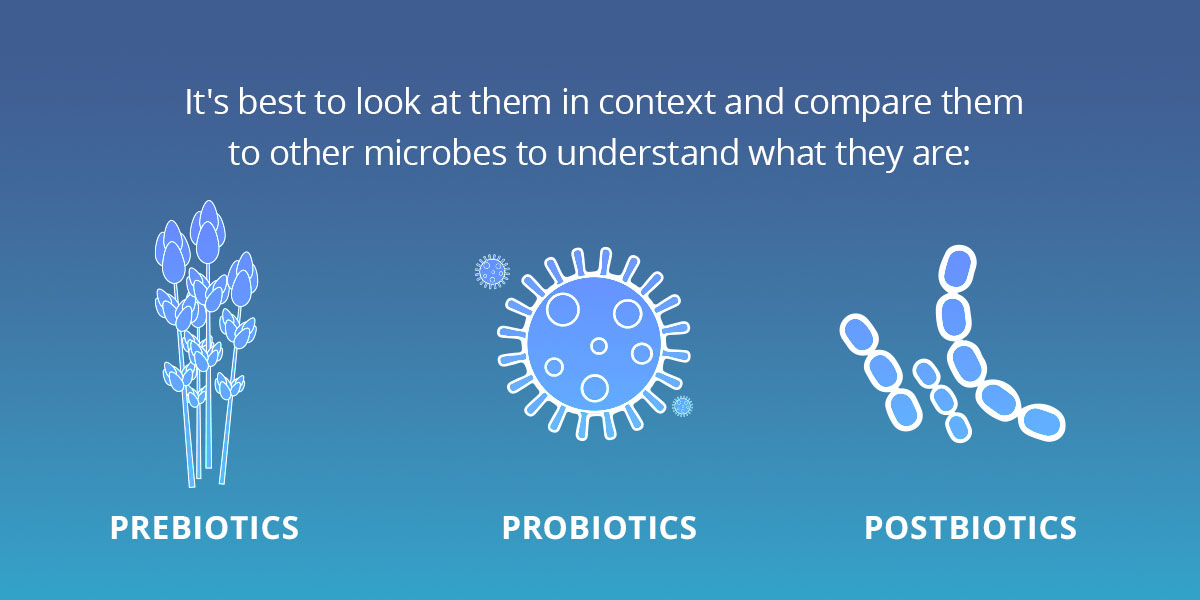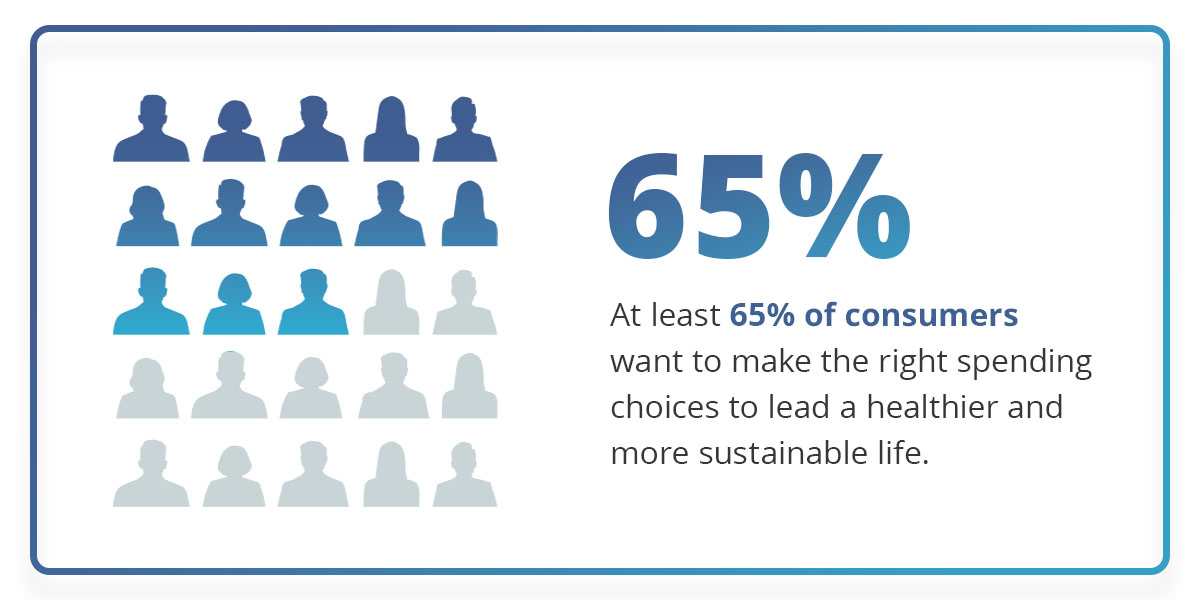Postbiotics: The Next Wave of Functional Beverage Innovation?

Consumers often make purchase decisions based on wellness and nutrition, and gut health is a primary focus of many of these choices. Preventive health care is the new normal, with gut health and immune system support taking center stage. Postbiotics in functional beverages could be the latest trend for today's health-conscious consumers. They offer considerable health benefits and are easy to integrate into most beverage types — a crucial factor considering integrating probiotics is much more challenging.
Although relatively new, postbiotics are already making waves among consumers and beverage brands alike. Brands in the right position can take advantage of this upcoming trend and give consumers an innovative take on functional beverages, focusing on specific health advantages.
What Are Postbiotics?
Postbiotics are activated microbes produced during the fermentation process. When probiotics consume prebiotics, they produce these bioactive compounds. In essence, probiotics digest prebiotics and metabolically transform them into beneficial, health-promoting compounds. It's best to look at them in context and compare them to other microbes to understand what they are:

- Prebiotics: Prebiotics are nutrients composed mainly of fiber. These nutrients feed the beneficial bacteria in the gut.
- Probiotics: Probiotics are good bacteria that live in the gut and support overall health. They convert fiber into compounds that have several overall health benefits.
- Postbiotics: Postbiotics are a by-product of probiotics' consumption of prebiotics. They are not live microorganisms like probiotics but bioactive compounds that deliver health-enhancing metabolites. They promote overall gut microbiome health.
Various types of postbiotics exist, including short-chain fatty acids, enzymes, lipopolysaccharides and various metabolites. While they occur naturally in the gut, most Western diets do not include enough fiber and live-culture-rich foods to produce postbiotics on their own.
Postbiotics represent an exciting opportunity in today's health-conscious market, and many food and beverage brands want to make them available to consumers.
Types of Postbiotics
Many types of postbiotics exist, including:
- Short-chain fatty acids: Short-chain fatty acids are the products of intestinal microbial fermentation of plant polysaccharides. They support various gut, immune, cardiovascular and metabolic functions. Short-chain fatty acids, such as acetate, propionate and butyrate, are pivotal in promoting gut health by serving as energy sources for colon cells, regulating inflammation and supporting metabolic processes.
- Cell-free supernatants: This type of postbiotic is a liquid and comprises metabolites formed through microbial growth and the remaining nutrients from certain probiotics.
- Cell wall fragments: Cell wall fragments are bacterial. One example is lipoteichoic acid (LTA), which may support immune function.
- Enzymes: Enzymes produce beneficial antioxidant compounds, an area of interest in probiotic research.
Probiotics vs. Postbiotics: What's the Difference?
The most crucial distinction between probiotics and postbiotics is that probiotics consist of living organisms, while postbiotics are the nonliving compounds that probiotics make. Postbiotics are created by fermentation and contain nutrients like vitamins B and K. They also consist of substances that slow down the growth of harmful bacteria.
Consumer Trends Driving the Next Wave of Functional Benefits
Many consumers want to move away from basic, one-dimensional nutrition. Instead, they're demanding products that tap into functional health, including stress relief, natural energy boosts and gut health.
Improved gut health is a significant wellness concern for consumers. Trends toward probiotic beverages are just the tip of the iceberg, and beverages supporting gut health will likely gain popularity for their digestive benefits and potential impact on mental well-being. Younger consumers, particularly millennials and Gen Z, are increasingly prioritizing gut health in their purchasing decisions, seeking products that align with their values of transparency and accountability.
Personalization is another notable trend in beverage consumption. Instead of generalized health and wellness, consumers seek personalization in their beverages. They want options tailored to their needs, particularly when it comes to health and wellness benefits. Many in this category enjoy at-home beverage creation, like kombucha kits. In addition to this personalization, they're taking natural options over processed ones, looking for clean labels and organic solutions.
As consumers pay more attention to what they put in their bodies, brand trust has become more critical than ever. Trusted beverage brands continue winning consumers over with scientifically backed ingredients and appealing textures and flavors.
The Benefits of Postbiotics in Functional Beverages: Why Should Consumers Care?
Healthy lifestyles are one of the most important trends in the beverage industry, with 82% of United States consumers considering wellness a top priority in their daily lives. Postbiotics form an essential part of this trend, poised to break into the market as consumers gear their purchase choices toward their overall health. Here are some of the many reasons consumers should care about this exciting development.
Digestive Health
We're learning more about the link between the digestive system and physical and mental health. Postbiotics are among the most interesting functional ingredients, supporting the gut microbiome and reducing inflammation. They can reduce the effects of food allergies and irritable bowel syndrome, providing consumers with considerable day-to-day advantages.
Beyond the Gut
Postbiotics exist in a fragile balance within the human body. When that balance is optimized, consumers can expect improved immune tolerance. Specific metabolites may produce antioxidants, which further boost the immune system. As well as inhibitors, they can act as enhancers, protecting the body from infection.
Amid the rise of functional sports drinks, postbiotics have significant benefits. Recent studies show that they can support exercise performance and recovery. They can improve cardiovascular health and reduce inflammation after exercise — essential for professional athletes and health-conscious consumers. Aside from the physical benefits, postbiotics can also improve mood, stress, depression and other aspects of mental health.

Some other benefits of postbiotics include:
- Women's health benefits: Women's health is another exciting avenue for postbiotics. Some research suggests that they can assist in the treatment of polycystic ovarian syndrome.
- Metabolic function: Studies indicate that specific postbiotics may support metabolic functions and signaling pathways, although more research is required. Emerging research suggests that postbiotics may also play a role in weight management by influencing metabolic pathways and improving insulin sensitivity.
The Advantages of Postbiotics in Functional Beverages: Why Should Beverage Brands Care?
Beverage brands should consider integrating postbiotics into functional formulations. Postbiotics offer exciting advantages over pre- and probiotics.
Stability
Postbiotics are stable over various temperatures and pH levels, allowing brands to add them to various beverages, including sodas, juices, sports drinks and more. Postbiotics are also shelf-stable and require no refrigeration.
Versatility
Postbiotics don't need to be the star of the show. Brands can stack them with other functional ingredients, including probiotics, giving consumers additional functionality. The fact that postbiotics are inactive and not alive makes them even more exciting, as they can survive delivery formats and manufacturing conditions that may be challenging for probiotics. They are also water-soluble for ease of formulation and can be delivered in powder form for brands who wish to offer convenience and long shelf life to their consumers.
Unlike probiotics, they can be added during the mixing stage, before heat treatment, providing compliance with labeling requirements. These advantages also mean no risk of product contamination, and as the cells are inactive, they do not multiply and affect beverage flavor. Some postbiotics can even enhance the flavor and mouthfeel of beverages without adding calories or sugars, staying true to consumer health and wellness goals.
Where Are Postbiotics Now: The Current State of Research and Development
Postbiotics are an exciting new development in the beverage industry, and research continues to emerge that demonstrates their positive impact. The gut microbiome and its impact on health and well-being are key drivers for today's consumers. Many want alternatives to added sugar and to enjoy drinks with health and wellness benefits. Brands are seeking formulations that meet these highly specific health demands.
Countries worldwide have embraced the potential of this exciting bioactive agent, and postbiotics continue to gain traction. They represent such innovation that many standards and qualification methods are still under debate. However, their health effects and ease of use are not under debate, and they are gaining more interest among consumers and beverage brands alike.
The Evolving Science Behind Postbiotics
The health potential associated with postbiotics has made them widely studied, with the lactobacillus genus being one of the most widely studied microorganisms in the world. Research has already shown many positive outcomes, and concrete evidence of their efficacy is consistently increasing. Future research will likely shed more light on how they play a role in our overall health and the best delivery systems beverage brands can use to provide consumers with these benefits.
As consumer awareness shifts from conventional to functional beverages, people want to know what's in their beverages and whether it works. The postbiotic innovation is more than halfway there. We know it works and provides multiple health and wellness benefits. However, the need for further studies and standardization still exists to provide clinically proven efficacy claims.
Challenges and Considerations for Postbiotics in Functional Beverages
While beverage brands have every reason to get excited at the opportunities that postbiotics present, some challenges and considerations exist for this new frontier of functional beverage innovation.
Scientific Research
Researchers have focused on bioactive compounds in recent years, and many have been identified. Despite this extensive research, a relatively small number of these compounds have been successfully incorporated into the functional beverage matrix. There is a distinct need for more knowledge and research to incorporate more compounds into beverages and determine the ideal blend of postbiotics for the desired health benefits.
Consumer Education
Digestive health is becoming more mainstream, in line with overall trends toward health and wellness. However, many consumers remain unclear about the differences between probiotics, prebiotics and postbiotics. Many, too, are unaware of the health advantages of postbiotics, which can lead to some suspicion. While consumer interests in probiotics continue to grow, postbiotics must catch up. This discrepancy presents an interesting opportunity for beverage brands to educate and innovate while relying on the existing popularity of probiotics.
An effective marketing campaign can address much of the necessary consumer education. Brands can develop innovative and exciting marketing materials to emphasize the proven benefits. Education may be even simpler for brands already offering organic, functional beverages. They can add postbiotics and expand existing beverage brands.
Regulatory Landscape
The Food and Drug Administration (FDA) has yet to make any specific statements regarding postbiotics. As they can fit within various regulatory categories, the FDA will likely regulate them per existing regulations regarding their intended use, safety and efficacy.
While the lack of regulation may concern consumers, the current regulatory gap allows more freedom in beverage development and commercialization. More research is needed to define suitable standards until regulatory bodies like the FDA develop a specific postbiotic framework.
Beverage Formulation
While some postbiotics integrate well into beverage formulations, there is also the question of flavor. Beverage brands may have to overcome certain flavor challenges to differentiate themselves and attract a broad range of consumers.
Sustainability Considerations

At least 65% of consumers want to make the right spending choices to lead a healthier and more sustainable life. Brands can use postbiotics to provide functional benefits while using sustainable packaging and sourcing. Several opportunities exist to reduce their environmental impact, including removing single-use packaging.
Additionally, postbiotics offer excellent premix opportunities. Brands can consolidate postbiotics into a single blend that makes it easier to dose into a beverage. Premixes also reduce the need for shipping from multiple locations, can reduce ingredient waste and provide cost efficiencies when brands scale up.
Opportunities and Market Potential for Beverage Brands
Beverage brands are already excited about the innovation opportunities that postbiotics present. The postbiotic market is expected to reach $3 billion by 2031 as brands find convenient and flavorful ways to integrate them into beverages. Increased research and development investment has increased market demand. However, the lack of regulatory frameworks remains an issue in some markets.
Creative entrepreneurs and beverage brands have a unique opportunity to capitalize on the opportunity that postbiotics create. Once the groundwork is in place, regulatory standards will likely catch up, and consumers will understand and enjoy the latest -biotic trend.
As the market expands, brands must innovate to stand out from incoming competitors. This innovation means offering unique formulations highlighting specific ingredients or flavor profiles.
Embrace Postbiotic Trends With BevSource Today

As consumers and researchers embrace this innovative and exhilarating trend, beverage brands have a unique opportunity to capture their attention. Postbiotics are poised to become popular across niche markets, from sports drinks to infused teas and healthy sodas. A strong postbiotic formulation propels your brand into new and existing markets, leveraging growing consumer preferences for healthy, functional beverage alternatives.
BevSource can support you as you break into fresh markets, helping you source, develop and formulate postbiotic beverages that meet changing consumer needs. Leverage our extensive skills, expertise and connections to enter an exciting era at the ideal time. Let's chat! Speak to a beverage expert and formulate your postbiotic beverage today!
